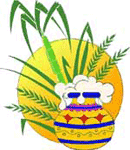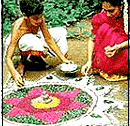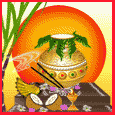|
India is a land of festivals. A majority of the population here depends on agriculture. As a result, most of the festivals are also related to the agricultural activities of the people. These festivals are celebrated with different names and rituals in almost all the states of India. Pongal is one of such highly revered festivals celebrated in Tamil Nadu to mark the harvesting of crops by farmers. Held in the middle of January, it is the time when the people get ready to thank God, Earth and their Cattle for the wonderful harvest and celebrate the occasion with joyous festivities and rituals.
|
|
|
Pongal is a popular harvest festival in South India. Named after a sweet rice dish, Pongal starts on January 14 of each year. The celebration lasts for three days.
 The first day of the festival is called Bhogi. On Bhogi all people clean out their homes from top to bottom, and collect all unwanted goods. In the evening, people will light bonfires and burn what can be burnt. In the village where I celebrated Pongal, the people lived in mud huts with thatched roves. The porches of these homes was fully covered by the thatch material, but somewhat elevated from the ground. This part of the home was taken apart and reconstructed on this day along with the front section of the walkway in front of their home. Both the porch and ground in front of their home was solid mud which had dried. So, to undo this, they put in water to soften it, and dug it out and rebuilt it.
The first day of the festival is called Bhogi. On Bhogi all people clean out their homes from top to bottom, and collect all unwanted goods. In the evening, people will light bonfires and burn what can be burnt. In the village where I celebrated Pongal, the people lived in mud huts with thatched roves. The porches of these homes was fully covered by the thatch material, but somewhat elevated from the ground. This part of the home was taken apart and reconstructed on this day along with the front section of the walkway in front of their home. Both the porch and ground in front of their home was solid mud which had dried. So, to undo this, they put in water to soften it, and dug it out and rebuilt it.
 After rebuilding it, they took cow dung and added water to make a paste and spread this mixture evenly over the new fixtures to coat and sanitize them. This mixture was also spread on the floor of the hut, on which we slept at night. As they don't have beds, we slept on the floor of the mud hut with a mat between our bodies and the floor. Although, the mixture had been spread on the floor, it did not at all smell fowl in any way. In addition, the family I stayed with installed a new ceiling fan for Pongal.
The second day of the festival, Surya Pongal, is the day on which the celebrations actually begins, is the first day of the Tamil month Thai. On this day, Surya, the sun God is worshipped and women will wake early on this day to create elaborate kolum on the grounds in front of their doorway or home. Kolums are created with colored rice flour placed on the ground carefully by using one's hand. The picture shown to the right shows the beginnings of this. The women in the picture took several hours to finish that kolum.
After rebuilding it, they took cow dung and added water to make a paste and spread this mixture evenly over the new fixtures to coat and sanitize them. This mixture was also spread on the floor of the hut, on which we slept at night. As they don't have beds, we slept on the floor of the mud hut with a mat between our bodies and the floor. Although, the mixture had been spread on the floor, it did not at all smell fowl in any way. In addition, the family I stayed with installed a new ceiling fan for Pongal.
The second day of the festival, Surya Pongal, is the day on which the celebrations actually begins, is the first day of the Tamil month Thai. On this day, Surya, the sun God is worshipped and women will wake early on this day to create elaborate kolum on the grounds in front of their doorway or home. Kolums are created with colored rice flour placed on the ground carefully by using one's hand. The picture shown to the right shows the beginnings of this. The women in the picture took several hours to finish that kolum.
 All people will wear their new dresses and use the new utensils or household items which replace the ones discarded the previous day. On this day the new rice is collected and cooked in pots until they over flow. It is this overflowing which means Pongal. This overflowing of rice is a joyous occasion, and the children and adults as well will shout out 'Pongal-o Pongal!' Children will dance and make music to the tune of these words.
The third day is called Maatu Pongal, maatu meaning cattle. This day is devoted to paying homage to cattle. Cows and Bulls are decorated with paint and bells and people pray to them.
The fourth day is termed as Kaanum Pongal. On this day, people travel to see other family members. As in the family I stayed, we traveled to another village to meet her family there. On this day, the younger members of the family pay homage to the elders, and the elders thank them by giving token money (like Rs. 10 or US 25cents). Another thing many do is leave food out on banana leaves for birds to take.
All people will wear their new dresses and use the new utensils or household items which replace the ones discarded the previous day. On this day the new rice is collected and cooked in pots until they over flow. It is this overflowing which means Pongal. This overflowing of rice is a joyous occasion, and the children and adults as well will shout out 'Pongal-o Pongal!' Children will dance and make music to the tune of these words.
The third day is called Maatu Pongal, maatu meaning cattle. This day is devoted to paying homage to cattle. Cows and Bulls are decorated with paint and bells and people pray to them.
The fourth day is termed as Kaanum Pongal. On this day, people travel to see other family members. As in the family I stayed, we traveled to another village to meet her family there. On this day, the younger members of the family pay homage to the elders, and the elders thank them by giving token money (like Rs. 10 or US 25cents). Another thing many do is leave food out on banana leaves for birds to take.
|


 The first day of the festival is called Bhogi. On Bhogi all people clean out their homes from top to bottom, and collect all unwanted goods. In the evening, people will light bonfires and burn what can be burnt. In the village where I celebrated Pongal, the people lived in mud huts with thatched roves. The porches of these homes was fully covered by the thatch material, but somewhat elevated from the ground. This part of the home was taken apart and reconstructed on this day along with the front section of the walkway in front of their home. Both the porch and ground in front of their home was solid mud which had dried. So, to undo this, they put in water to soften it, and dug it out and rebuilt it.
The first day of the festival is called Bhogi. On Bhogi all people clean out their homes from top to bottom, and collect all unwanted goods. In the evening, people will light bonfires and burn what can be burnt. In the village where I celebrated Pongal, the people lived in mud huts with thatched roves. The porches of these homes was fully covered by the thatch material, but somewhat elevated from the ground. This part of the home was taken apart and reconstructed on this day along with the front section of the walkway in front of their home. Both the porch and ground in front of their home was solid mud which had dried. So, to undo this, they put in water to soften it, and dug it out and rebuilt it.
 After rebuilding it, they took cow dung and added water to make a paste and spread this mixture evenly over the new fixtures to coat and sanitize them. This mixture was also spread on the floor of the hut, on which we slept at night. As they don't have beds, we slept on the floor of the mud hut with a mat between our bodies and the floor. Although, the mixture had been spread on the floor, it did not at all smell fowl in any way. In addition, the family I stayed with installed a new ceiling fan for Pongal.
The second day of the festival, Surya Pongal, is the day on which the celebrations actually begins, is the first day of the Tamil month Thai. On this day, Surya, the sun God is worshipped and women will wake early on this day to create elaborate kolum on the grounds in front of their doorway or home. Kolums are created with colored rice flour placed on the ground carefully by using one's hand. The picture shown to the right shows the beginnings of this. The women in the picture took several hours to finish that kolum.
After rebuilding it, they took cow dung and added water to make a paste and spread this mixture evenly over the new fixtures to coat and sanitize them. This mixture was also spread on the floor of the hut, on which we slept at night. As they don't have beds, we slept on the floor of the mud hut with a mat between our bodies and the floor. Although, the mixture had been spread on the floor, it did not at all smell fowl in any way. In addition, the family I stayed with installed a new ceiling fan for Pongal.
The second day of the festival, Surya Pongal, is the day on which the celebrations actually begins, is the first day of the Tamil month Thai. On this day, Surya, the sun God is worshipped and women will wake early on this day to create elaborate kolum on the grounds in front of their doorway or home. Kolums are created with colored rice flour placed on the ground carefully by using one's hand. The picture shown to the right shows the beginnings of this. The women in the picture took several hours to finish that kolum.
 All people will wear their new dresses and use the new utensils or household items which replace the ones discarded the previous day. On this day the new rice is collected and cooked in pots until they over flow. It is this overflowing which means Pongal. This overflowing of rice is a joyous occasion, and the children and adults as well will shout out 'Pongal-o Pongal!' Children will dance and make music to the tune of these words.
The third day is called Maatu Pongal, maatu meaning cattle. This day is devoted to paying homage to cattle. Cows and Bulls are decorated with paint and bells and people pray to them.
The fourth day is termed as Kaanum Pongal. On this day, people travel to see other family members. As in the family I stayed, we traveled to another village to meet her family there. On this day, the younger members of the family pay homage to the elders, and the elders thank them by giving token money (like Rs. 10 or US 25cents). Another thing many do is leave food out on banana leaves for birds to take.
All people will wear their new dresses and use the new utensils or household items which replace the ones discarded the previous day. On this day the new rice is collected and cooked in pots until they over flow. It is this overflowing which means Pongal. This overflowing of rice is a joyous occasion, and the children and adults as well will shout out 'Pongal-o Pongal!' Children will dance and make music to the tune of these words.
The third day is called Maatu Pongal, maatu meaning cattle. This day is devoted to paying homage to cattle. Cows and Bulls are decorated with paint and bells and people pray to them.
The fourth day is termed as Kaanum Pongal. On this day, people travel to see other family members. As in the family I stayed, we traveled to another village to meet her family there. On this day, the younger members of the family pay homage to the elders, and the elders thank them by giving token money (like Rs. 10 or US 25cents). Another thing many do is leave food out on banana leaves for birds to take.